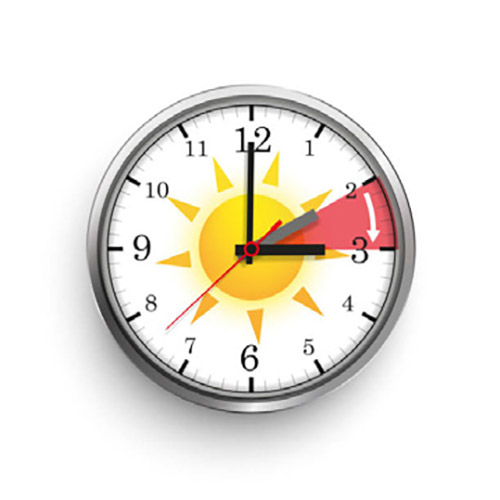

Occasionally, disturbing developments that may impinge on Jewish observance can “come out of left field,” with little warning and significant possible consequences. Such was the case last week, when members of the United States Senate passed a bill to make daylight saving time permanent and to abolish the twice-a-year resetting of clocks. Most notably, the bill arose and passed with little warning, no debate, and with the unanimous approval of all the senators present.
An impetus to change the current system may have come from the fact that it is widely unpopular—a November 2019 Associated Press-NORC poll, cited
in recent coverage by The New York Times, revealed that seven in 10 Americans prefer not to switch the clocks back and forth each year (though they were divided in their preferences of daylight saving time versus standard time).
In a March 15 statement on their website, the Agudath Israel of America spelled out why the observant Jewish community has deep reservations about the U.S. Senate’s new legislation: “Our concerns revolved around two areas. First, as a representative of Orthodox Jewish schools, we shared the views of those in the school community who were concerned about children walking, carpooling or taking the bus to school in the pre-sunrise darkness and the increased risk of accidents and injuries that resulted. Indeed, during the Arab oil embargo in early 1970s, when a year-long DST was attempted (but was quickly ended due to public outcry), there were numerous reported incidents of children being injured and assaulted as they traveled to school in the pitch-black streets. Whatever benefit that might accrue due to extended DST pales in comparison to the cost in safety of our children.
“The second concern related to an unintended consequence the change in DST would have on a fundamental aspect of Jewish religious life—morning prayers. Under Jewish law, morning prayers, and the rituals associated with them, are regulated in time-specific ways and must be performed no earlier than certain specified times. Synagogue schedules accommodate those times. With a change in DST, and the later sunrise, the times for prayers and their accompanying rituals will be disrupted—which, in turn, will put into jeopardy their proper fulfillment, discourage synagogue attendance, and result in late arrival for work.”
An article by Rabbi Menachem Posner for Chabad.org amplified these concerns, adding that while the “good news” with the U.S. Senate’s legislation would be an hour-later start to Shabbat in the winter months, “the challenge” with the change would be the later start time for Shacharit. Using Detroit as an example, he pointed out that in the winter months sunrise would now not arrive until 9 a.m., making davening with a minyan before work unlikely for most people.
At press time, the Orthodox Union was preparing a statement in opposition to the U.S. Senate legislation.
In the days after the U.S. Senate’s vote, two other facts became clear.
One is that the institution of daylight saving time has historically inspired concerns in the observant Jewish community. A Jewish Telegraphic Agency (JTA) dispatch on March 3, 1930 reported that the Council of Orthodox Jewish Congregations in Baltimore opposed the imposition of daylight saving time in that area. A March 2018 JTA story reported that as the state of Florida considered a bill entitled the Sunshine Protection Act to institute daylight saving time year round, the Agudath Israel of Florida lobbied state legislators in opposition of the bill. A JTA story in September 1989 pointed out that Israel’s imposition of daylight saving time over the spring and summer had saved the country an estimated $7 million in energy costs, yet it inspired opposition from Orthodox leaders, who were upset that “they would have to awaken at an ungodly hour to recite their Rosh Hashanah and Yom Kippur prayers.”
Another factor is that other leaders in the federal government, as well as some noted media sources, are not experiencing the same urgency to change the current system of twice-a-year clock changes. A March 17 story in The Hill reported that while some leaders in the U.S. House of Representatives are inclined to follow the Senate’s lead, others are not. The story quoted House Minority Whip Steve Scalise (R-La.), who stated: “To be candid, it’s not been on my radar. We got other things that have been more front and center,” and stated that House Majority Leader Steny Hoyer (D-Md.) wouldn’t offer a schedule for when the House would act on the legislation. The story also reported that White House spokesperson Jen Psaki said that the Biden Administration “didn’t have a specific position’’ on the legislation.
An editorial in Bloomberg News, reprinted in the Star Ledger on March 20, ran with the headline “Just say no to permanent daylight saving.” The editorial noted, “Perhaps they don’t remember how unhappy everyone was the last time Congress imposed year-round DST, during the oil embargo of the early 1970s,” and urged House of Representatives members: “Before repeating a failed experiment, they should slow down and shed some more sunlight on this debate.”
By Harry Glazer













